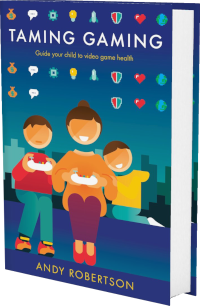 Android
Android iOS
iOS Mac
Mac Switch
Switch Wii
Wii Wii U
Wii U PC
PC PS4
PS4 PS5
PS5 Xbox One
Xbox One Xbox X|S
Xbox X|S Play Overview
Play Overview
Ancestree (2017) is a collecting and sequencing game where you compete to build the strongest family tree. You select and link tiles, building your family person by person, scoring points for marriages, wealth and continuous generations. It is a strategic game about carefully using shared resources to grow your heritage, whilst stopping others from doing the same.
You start by shuffling the Ancestor tiles and dealing six to each player. Each tile represents one person from a specific tribe indicated by a colour and a symbol. During each turn, everyone simultaneously places one tile from their hand face down in front of them, then passes the rest to the next player.
Once everyone has done this, they are flipped over and tactically added to your family tree. Each tile must be linked by completing a leaf or heart shape. You continue until everyone has placed five tiles into their tree.
The twist is that your score relates only to the players on either side of you. Who has the most boasting rights for their family? The tallest chain (Dynasty) for each of the five tribes wins a point. You can also score bonus points by collecting tiles with coins on them. Play continues over three rounds, with players continuing to add to their family tree from the previous rounds.
As you play, the value of combinations rises and after the final round, there is a chance to score bonus points for people in your family who are linked by hearts/marriages. The player who scores the most points in total is the winner.
What starts as a simple tile placement game, quickly becomes a strategic battle to create the strongest family by using resources carefully and keeping your options open, so that you can make the best use of any more valuable resources later in the game.
Our examiner, Rob Prior, first checked Ancestree 2 years ago. It was re-examined by Jo Robertson and updated yesterday.
You start by shuffling the Ancestor tiles and dealing six to each player. Each tile represents one person from a specific tribe indicated by a colour and a symbol. During each turn, everyone simultaneously places one tile from their hand face down in front of them, then passes the rest to the next player.
Once everyone has done this, they are flipped over and tactically added to your family tree. Each tile must be linked by completing a leaf or heart shape. You continue until everyone has placed five tiles into their tree.
The twist is that your score relates only to the players on either side of you. Who has the most boasting rights for their family? The tallest chain (Dynasty) for each of the five tribes wins a point. You can also score bonus points by collecting tiles with coins on them. Play continues over three rounds, with players continuing to add to their family tree from the previous rounds.
As you play, the value of combinations rises and after the final round, there is a chance to score bonus points for people in your family who are linked by hearts/marriages. The player who scores the most points in total is the winner.
What starts as a simple tile placement game, quickly becomes a strategic battle to create the strongest family by using resources carefully and keeping your options open, so that you can make the best use of any more valuable resources later in the game.
Our examiner, Rob Prior, first checked Ancestree 2 years ago. It was re-examined by Jo Robertson and updated yesterday.
There are lots of games similar to Ancestree. Here are some we picked for you:
 Play Style
Play Style
This is a Sequencing and Strategy game with Collecting elements. You can play with 2 to 6 players in the same room.
You can play this game in the following styles:
 Duration
Duration
Learn to Play: This takes 20 minutes to learn. Although the family tree building is simple, the complexity of the score for the tribes and the compound benefits of building on the same tribes each round take longer to understand.
When you first play:
Play Time: It takes between 5 minutes and 10 minutes to play a round of this game.
When you first play:
- Take time to study all the Ancestor cards, so that you know their links and values.
- Ignore the marriage rule to simplify the scoring system.
Play Time: It takes between 5 minutes and 10 minutes to play a round of this game.
 Benefits
Benefits
This game is good if you want to:
 Age Ratings
Age Ratings
Skill Level
6+ year-olds usually have the required skill to enjoy this game. Younger players may need support with counting and keeping score.
Content Rating
We rate this suitable for 3+ years-olds. Game Details
Game Details
Release Date: 01/01/2017
Skill Rating: 6+ year-olds
Players: 2-6
Genres: Sequencing, Strategy and Collecting
Accessibility: 33 features
Components: Placeables, Score Board and Tokens
Developer: Calliope Games (@CalliopeGames)
© 2024 Family Gaming Database













